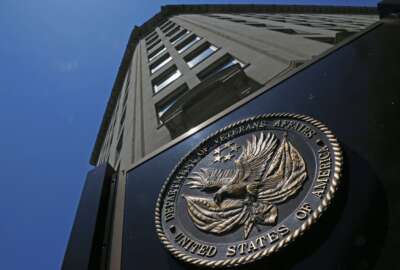
Private sector should ‘complement,’ not replace VA health care
Rep. Seth Moulton (D-Mass.) has introduced a bill to link the Veterans Affairs Department with private sector technology, in the hope of creating an opportunity for...
A pilot program proposing the use of private sector technology to make it easier for veterans to schedule their own medical appointments is gaining cautious support from veterans advocates and Congress.
Rep. Seth Moulton’s (D-Mass.) Faster Care for Veterans Act of 2016 has 50 supporters on Capitol Hill — with equal representation from both sides of the aisle — and is currently being reviewed by his chamber’s Veterans Affairs committee.
“It doesn’t make sense to me that people in the private health care system can have access to scheduling apps that are not available to veterans. If our standard is that veterans deserve the best health care in the world because that’s what they’ve earned, then they should have access to these systems as well,” Moulton said earlier this month at an oversight hearing. “While it seems that the VA is focused on developing their own solutions at great cost and taking enormous amounts of time, it’s frustrating to us that we see our friends and colleagues in the private sector using these applications and systems available today.”
If the idea of a pilot program sounds familiar, that’s because LaVerne Council, VA chief information officer and assistant secretary in the Office of Information and Technology, briefed members of Congress at the same oversight hearing on a similar in-house program VA was rolling out in April.
The Veterans of Foreign Wars also experienced a sense of deja vu.
“At this moment, VA’s already underway in the pilot program,” VFW Senior Legislative Associate Carlos Fuentes told Federal News Radio. “So really what we want to do is see what the [VA] pilot program produces before really engaging in this new one. That said, we certainly support the idea behind his proposal and self-scheduling as a whole.”
Being ‘veteran-centric’
Fuentes said he understands that lawmakers have their respective constituencies that they are working to help, and they have specific concerns, including the VA health care system.
When broader legislation is being considered, VFW tends to support the larger legislative package and works to make sure those smaller ideas are included in the final draft.
“I think this is something we would do with Rep. Moulton’s bill, really work with VA to ensure that it also meets his intent and addresses the concerns he’s brought up,” Fuentes said.
Fuentes said the VFW agrees that overall the VA scheduling system needs improvement. But while self-scheduling should be an option, Fuentes said, it should not be the only way of making an appointment.
“There are going to be veterans that either don’t want to or just prefer to continue calling a scheduler to schedule their appointment,” Fuentes said.
That human touch can also make it easier to squeeze in a veteran if another appointment is canceled or a health provider’s schedule allows for extended hours, similar to the way a restaurant can take reservations over the phone and not just online.
“Overall with VA health care reform, our goal is that anything that is pushed in Congress or enacted into law be veteran-centric,” Fuentes said. “Have the veterans’ needs and preferences as the priority. We’ve done surveys, we’ve spoken to our members and done a lot of tracking of the VA Choice Program and have really taken a proactive approach to evaluating what are the issues in terms of VA healthcare and identifying common sense solutions to a lot of problems. Through that work we’ve really been able to gauge that the veteran community as a whole wants to improve the VA health care system and integrate the community into the system, so that the private sector complements VA and not supplants VA.”
Integration issues
According to the text of Moulton’s bill, within four months of enactment, the VA would launch the pilot program “under which veterans use an Internet website to schedule and confirm medical appointments at medical facilities of the Department of Veterans Affairs.”
Once a contractor is selected the VA would ensure the software is integrated with its system.
The program would run for 18 months with the possibility of an extension if the pilot proves to be working.
The bill’s co-sponsor, Rep. Cathy McMorris Rodgers (R-Wash.), said in a statement that the bill empowers veterans “to make their own health care decisions, while giving VA employees more tools to do their jobs effectively and efficiently.”
Joy Ilem, legislative director at the Disabled American Veterans Charity, wonders if the integration with VA’s system could actually be a reality.
VA’s electronic records system is an “organic” one, Ilem said, and one that works well for the department because it was developed early on specifically for the agency and its veterans.
“This is one of the things that’s been really problematic for VA: Is anybody able to integrate with their IT infrastructure?” Ilem said. “While they’re trying to deal with all these safety issues and privacy issues and making sure people’s data is secure, anybody who’s ever tried to link on to VA’s IT infrastructure for various reasons to do various things has not had a good outcome. So that’s one of the challenges that I see. Not that this isn’t an excellent idea, I think it just would be that they’re going to have to really make sure VA’s system is compatible to bring somebody in from the outside.”
And while the VA is in the midst of a transformation to address a variety of issues — like scheduling, security and information sharing — whether the private sector can provide the silver bullet remains to be seen.
“It’s like an old car that’s running very well and very relevant,” Ilem said. “If you’re trying to put in a new part that’s manufactured today to work with that [car], there are sometimes issues. That will be the challenge on any of these innovative ideas … on the table right now.”
Copyright © 2024 Federal News Network. All rights reserved. This website is not intended for users located within the European Economic Area.





